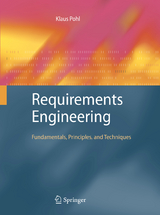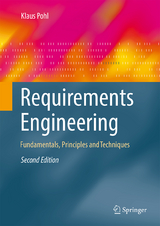Requirements Engineering
Springer Berlin (Verlag)
978-3-642-12577-5 (ISBN)
- Titel erscheint in neuer Auflage
- Artikel merken
Dr. Klaus Pohl is full professor for software systems engineering and director of the Institute for Computer Science and Business Information Systems at the University of Essen, Germany. He holds a degree in computer science (FH Karlsruhe, Germany) and a degree in information systems (Univ. Konstanz, Germany). Klaus Pohl received his PhD and his habilitation in Computer Science from the Technical University of Aachen, Germany. His current research interest include software product lines, requirements management and scenario-based test case derivation. Current research projects include the European ITEA initiative in software product lines (the CAFÉ project) and various industrial uptake projects with leading Germany companies. Klaus Pohl is (co-)author of over 90 referred publications in the area of requirements and software engineering. He as published a book on Process-Centred Requirments Engineering (RSP/Wiley) and is (co-editor) of more than 15 conference and workshop proceedings. Moreover, he is/was co-editor of several special issues of well-established journals, including 'Introduction of Software Product Lines', IEEE Software, 2002. He is a member of the IFIP working-group 2.9 on software requirements engineering, member of the steering committee of the IEEE Intl. Requirements Engineering Conference (RE), member of the editorial board of the Requirements Engineering Journal and founder and member of the advisory board of the Requirements Engineering: Foundation for Software Quality (REFSQ) workshop series. He is/was program chair of various conferences and workshops including the IEEE Joint Intl. Requirements Engineering Conference (RE 02).
Fundamentals and Framework..- Motivation.- Requirements.- Continuous Requirements Engineering.- The Requirements Engineering Framework.- System Context,Recommended Literature for Part II..- System and Context Boundaries.- Structuring the System Context.- Requirements Artefacts.- Goals.- Scenarios.- Solution-Oriented Requirements.- Core Activities.- Documentation.- Elicitation.- Negotiation.- Validation,Recommended Literature for Part V.- Fundamentals of Requirements Validation.- Validation Techniques.- Assistance Techniques for Validation.- Management,Recommended Literature for Part VI..- Fundamentals of Requirements Management.- Requirements Traceability.- Prioritising Requirements.- Change Management for Requirements.- COSMOD-RE: the Goal- and Scenario-Based RE Method.- Fundamentals.- The COSMOD-RE Method.- Applying COSMOD-RE: an Example.- Software Product Lines and Requirements-Based Testing.- Requirements Engineering for Software Product Lines.- Requirements-Based Testing: the ScenTED Approach.
lt;p>From the reviews:
"[...] Pohl succeeds in providing "a comprehensive, well-structured, and easy-to-read ... compendium" on the field of requirements engineering where such did not exist previously. It serves as an excellent reference volume [...]. The layout, visuals, and organization of the book are exceptional. [...] Students, practitioners, and researchers with an interest in requirements engineering for software and systems engineering should consider adding this unique book to their library." ACM Computing Reviews, Michael G. Murphy, Southern Polytechnic State University, Marietta, GA, USA, January 2011
"800-page volume divided into eight parts and 38 chapters. Pohl went to great lengths in organizing the book, and has been successful in providing a clean, comprehensive, and well-structured work. ... Each part provides collections of basic and advanced reading lists for the individual chapters. The book concludes with a very helpful glossary of terms, a comprehensive collection of references, and a well-organized index. Summing Up: Highly recommended. Upper-division undergraduate through professional collections." J. Beidler, Choice, Vol. 48 (6), February 2011
| Erscheint lt. Verlag | 24.7.2010 |
|---|---|
| Zusatzinfo | XVII, 813 p. |
| Verlagsort | Berlin |
| Sprache | englisch |
| Maße | 193 x 260 mm |
| Gewicht | 1888 g |
| Themenwelt | Informatik ► Software Entwicklung ► Requirements Engineering |
| Informatik ► Software Entwicklung ► User Interfaces (HCI) | |
| Informatik ► Weitere Themen ► Hardware | |
| Mathematik / Informatik ► Mathematik ► Finanz- / Wirtschaftsmathematik | |
| Schlagworte | Anforderungsanalyse (EDV) • Change Management • Design • documentation • Modeling • Requirements Engineering • requirements management • Software engineering • system development • Validation |
| ISBN-10 | 3-642-12577-8 / 3642125778 |
| ISBN-13 | 978-3-642-12577-5 / 9783642125775 |
| Zustand | Neuware |
| Haben Sie eine Frage zum Produkt? |
aus dem Bereich





